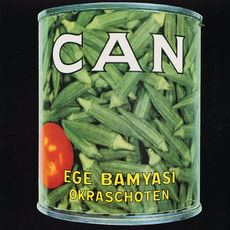Influence is a shapeless thing, moving and rearranging based on sounds from the past and how they align with sounds from the present. In the case of progressive rock, a genre relocated from the pop charts to sheet music stands and art rock-favored stereos over the past four decades, influence has shifted in a similar way—later records that expanded the lexicon have lapped previous records with the incorporation of new styles, cultures and their corresponding sounds. Prog may not be burning up the rock charts, but you can see the everlasting influence of the genre in bands ranging from Tool to Kanye West and beyond. With that said, here are ten crucial progressive rock releases for 2021 and beyond.
Pink Floyd - The Dark Side of the Moon (Harvest Records, 1973)
Maybe the most recognizable prog album, and certainly the best selling, is Pink Floyd's masterpiece The Dark Side of the Moon. Released in 1973, the album bounces from drug-laden slide guitar blues to tense synth to soul-tinged rock with ease—showing the insane versatility and the well-executed songwriting, no matter what genre. Though the record's single is one of the few pop songs to play out in a 7/4 time signature, the main funk bassline in "Money" is utter perfection, possibly only bested by the similarly great sax solo.
Rush - Moving Pictures (Anthem Records, 1981)
Speaking of pop hits with odd time signatures, "Tom Sawyer" wasn't just a show of force for the band, it was a massive pop hit that propelled Rush from nerdy genre favorite to a charting rock juggernaut. The classic album not only includes the fan favorite "Limelight" but also includes "YYZ," Rush's answer to the Led Zeppelin classic "Moby Dick" where drummer Neil Peart showcased his insane abilities behind the kit.
King Crimson - In the Court of the Crimson King (Island, 1969)
Though it may be best known by the title track (which Kanye West sampled for his megahit "Power"), Crimson's influence goes much farther and wider than just the hip-hop set. Featuring the iconic album art by Barry Godber, In the Court is an excellent example of an album that is as ambitious as it is well-executed. Featuring experimentation with woodwinds, brass, piano, organs, Mellotron, atypical percussion and even multiple overdubs, King Crimson achieve an uncharacteristically wide sound via layering of instrumentation—all while using only an 8-channel board. Considered by some to be the pinnacle of progressive rock, In the Court of the Crimson King is a timeless classic in any genre.
Yes - Close to the Edge (Atlantic, 1972)
Progressive rock would not exist if not for the explorations by the UK greats Yes, and Close to the Edge is not only their most celebrated achievement, it might be their most impressive and expansive. Featuring the classic lineup of Jon Anderson, Bill Bruford (who would join King Crimson after this LP), Rick Wakeman (who would later play with everyone from Black Sabbath to Bowie), Steve Howe and Chris Squire, the band's instrumental prowess was virtually unmatched at the time, as was their penchant for experimentation. Ambient, classical and jazz seamlessly come together with tape loops, and the growing electronic and synth worlds; Close to the Edge is a bold work that would not only land, but influence generations to come.
Genesis - Selling England by the Pound (Charisma Records, 1973)
Considering their successes in the '80s, it would be easy to forget that Peter Gabriel, Phil Collins and the Genesis that created the pop juggernaut Invisible Touch were not just Billboard chart favorites. For a period of time they had all aligned under the flag of progressive rock with Selling England by the Pound and its successor The Lamb Lies Down on Broadway, with both being emblematic of Genesis's progressive sound and crucial records of the era. Selling England is the more impressive of the pair, showing off the band's chops in a way that keeps the songs just tight enough to give room for the band to not meander too far from the core ideas.
Create a free account to keep reading






